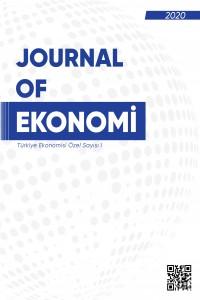Abstract
İnsanlar yeryüzünün doğal kaynaklarını onun bunları yenileyebileceğinden daha hızlı tüketmektedirler. İnsanların bu tutumlarının bedelini gelecek kuşaklar ödeyeceklerdir. Gelecek kuşaklara bu bedeli ödetmemek için artık parasal kârları ençoklamak, niceliksel olarak büyümek ve bolluk yaratmak doğrultusunda işleyen şimdiki ekonomik faaliyetleri bir başka biçime dönüştürmek kaçınılmazdır. Peren Teoremi göstermektedir ki Dünya örneğinde de olduğu gibi kapalı bir sistem doğal kaynak tüketimi eş düzeyde bir doğal kaynak üretimi ile yaşayabilir. Üretim ile tüketim arasındaki denge çok uzun bir süre bozulursa gezegen doğal bir ölüm ile karşılaşır. Bunu sağlamak üzere Dünya üzerinde yaşayan ve/veya dünya sayesinde yaşayan tüm insanların kişi başına doğal kaynak tüketimlerini artan küresel nüfusla orantılı bir biçimde azaltmak gerekir.
Keywords
Peren Teoremi Matematiksel çerçeve Doğal kaynak tüketimi İnsani geçim Bireysel refah etkileri Ekolojik sömürü
References
- Gadatsch, A.; Ihne, H.; Monhemius, J.; Schreiber, D. (ed., NachhaltigesWirtschaften im digitalenZeitalter, Springer Yayınevi, Berlin, 2018.
- Global Footprint Network, (2017), http://www.footprintnetwork.org/,erişim tarihi: 27.07.2017.
- International CentreforSustainable Development – IZNE, (2017), https://www.h-brs.de/de/izne, erişim tarihi: 27.07.2017.
- Peren, F. W., The Peren Theorem, yayınlanmamış eser, New York, 2012.
- Peren, F. W., “Unsustainable Future: The Mathematical Frame in Which We Live”, Review of Business: Interdisciplinary Journal on Risk and Society, Sayı: 39(2), (2019), 32-35.
- Wikipedia, (2017), https://en.wikipedia.org/wiki/Population_growth , erişim tarihi: 27.07.2017.
- World Wide Fund for Nature – WWF, (2017), http://wwf.panda.org/about_our_earth/all_publications/living_planet_report_timeline/lpr_2012/, erişim tarihi: 27.07.2017.
Abstract
Humans consume the natural resources of the earth faster than the earth is able to regenerate them. Mankind on the whole lives above its means and often at the expense of future generations. Current economic activity with the aim of maximizing monetary profits and generating quantitative growth and prosperity cannot be continued. The Peren Theorem demonstrates that the consumption of natural resources within a closed system, as represented by the earth, is only possible if their consumption is able to naturally regenerate. If this balance is disturbed for too long a period, then this results in the natural death of the planet. With an increasing global population the per capita consumption of natural resources of all humans living on or from the earth must be proportionately reduced.
Keywords
Peren Theorem Mathematical frame Consumption of natural resources Human lifestyle Human livelihood Individual prosperity effects Ecological exploitation
References
- Gadatsch, A.; Ihne, H.; Monhemius, J.; Schreiber, D. (ed., NachhaltigesWirtschaften im digitalenZeitalter, Springer Yayınevi, Berlin, 2018.
- Global Footprint Network, (2017), http://www.footprintnetwork.org/,erişim tarihi: 27.07.2017.
- International CentreforSustainable Development – IZNE, (2017), https://www.h-brs.de/de/izne, erişim tarihi: 27.07.2017.
- Peren, F. W., The Peren Theorem, yayınlanmamış eser, New York, 2012.
- Peren, F. W., “Unsustainable Future: The Mathematical Frame in Which We Live”, Review of Business: Interdisciplinary Journal on Risk and Society, Sayı: 39(2), (2019), 32-35.
- Wikipedia, (2017), https://en.wikipedia.org/wiki/Population_growth , erişim tarihi: 27.07.2017.
- World Wide Fund for Nature – WWF, (2017), http://wwf.panda.org/about_our_earth/all_publications/living_planet_report_timeline/lpr_2012/, erişim tarihi: 27.07.2017.
Details
| Primary Language | Turkish |
|---|---|
| Subjects | Economics |
| Journal Section | Translation |
| Authors | |
| Translators |
Pınar D. Akyazgan This is me |
| Publication Date | March 31, 2020 |
| Submission Date | April 20, 2020 |
| Published in Issue | Year 2020 - Turkish Economy |
As the first video article in Turkey, it was featured in the Journal of Ekonomi.
Instagram: @journalofekonomi
YouTube: Journal of Ekonomi
---------------------------------------------------------
View Watch Video Articles
---------------------------------------------------------
* (Kuru ve Balkan, 2020: Türkiye Ekonomisi Özel Sayısı, 5-9)
* (Işık et al., 2019: 1(1): 1-27)
* (Radulescu and Sandra, 2019 1(1): 28-32)
* (Berger, 2019, 1(1): 43-48)
* (Özelli, 2019 1(1): 49-83)
* (Crenguta, 2019 1(1): 84-86)
-------------------------------------------------------

